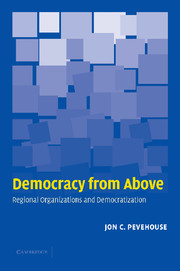Book contents
- Frontmatter
- Contents
- List of figures and tables
- Acknowledgments
- Abbreviations
- 1 Democratization and international relations
- 2 Regional organizations, the transition to and the consolidation of democracy
- 3 The supply-side of democratization and initial tests
- 4 Regional organizations and the transition to democracy
- 5 Regional organizations and the transition to democracy: evidence from cases
- 6 Regional organizations and democratic consolidation
- 7 Regional organizations and the consolidation of democracy: evidence from cases
- 8 Conclusion
- References
- Index
4 - Regional organizations and the transition to democracy
Published online by Cambridge University Press: 22 September 2009
- Frontmatter
- Contents
- List of figures and tables
- Acknowledgments
- Abbreviations
- 1 Democratization and international relations
- 2 Regional organizations, the transition to and the consolidation of democracy
- 3 The supply-side of democratization and initial tests
- 4 Regional organizations and the transition to democracy
- 5 Regional organizations and the transition to democracy: evidence from cases
- 6 Regional organizations and democratic consolidation
- 7 Regional organizations and the consolidation of democracy: evidence from cases
- 8 Conclusion
- References
- Index
Summary
A major set of variables often discounted in studies of democratization concerns international factors. Comparative scholars have traditionally chosen to concentrate on the internal dynamics of the nation-state in transition, embracing such concepts as virtu (the influence of specific individuals) and fortuna (the influence of unexpected events) – representing the importance of random chance and situational factors, respectively (O'Donnell and Schmitter 1986: 5). This approach not only eschews international variables but domestic structural variables as well. Much descriptive and choice-theoretic work on transitions continues this perspective (cf. Przeworski 1991; Schmitter and Karl 1991). While this approach is extremely useful if the goal is to discuss a single transition, it is less useful when building a broader theory of transitions.
Recently, domestic structural explanations have reemerged in the study of transitions (Gasiorowski 1995; Haggard and Kaufman 1995a; Ruhl 1996). This emerging literature (re)focuses on factors such as economic conditions or financial crises and their propensity to constrain or compel the democratization process (or the process of democratic breakdown). In addition, factors such as collective action problems (Clemens 1998), modernization (Diamond 1992), and ethnic homogeneity (Linz and Stepan 1996) have been emphasized in recent work. Still, with a few exceptions (Kadera, Crescenzi, and Shannon 2003; Reiter 2001a; Whitehead 1996a), even most structural-oriented theories still ignore influences that arise outside the state. Those that do discuss international influences on the transition process tend to examine isolated case studies.
- Type
- Chapter
- Information
- Democracy from AboveRegional Organizations and Democratization, pp. 77 - 110Publisher: Cambridge University PressPrint publication year: 2005



